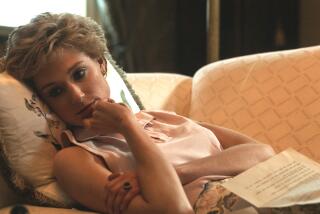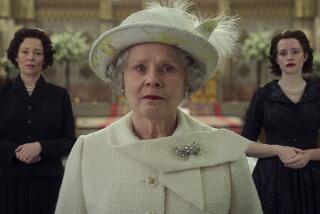Using the Sword of Celebrity
- Share via
AMAGANSETT, N.Y. — In this age of celebrity, it may be said of certain people, however horrifying the thought, that death becomes them, and that is certainly true of Diana, princess of Wales, as it was of Elvis Presley and Marilyn Monroe. Had she lived, she could have doddered off into senility, tottering from one sordid affair to another, from one escapade to another, a better, more elegant version of Elizabeth Taylor--a celebrity for the ages. Instead, she is frozen forever in her youth and beauty, a transcendent figure risen from celebrity to legend.
Of course, it didn’t take death to anoint Diana. She was inarguably the most celebrated celebrity of our time, taking up where Jacqueline Kennedy Onassis left off and surpassing her. Di was the cynosure of the entire world. An editor at People magazine once told me that Di covers (43 of them!) outsold all others, and even the circumstances of her death, hounded as she was by paparazzi, were a macabre testament to her ability to inspire our voyeurism.
Theories abound as to why this was so: her youth, her attractiveness, her position, her taste, her vulnerability, her poignant repression by the monarchic powers and her feisty rebellion against them, her compassion, the glamorous excitement of her life, the sheer momentum of celebrity itself or some combination of these. By tabloid lights, Di certainly seemed to have it all, though none of this may really explain the hold she had on us. For that, one must look to an unlikely source: Di as avenging democrat.
Begin with the monarchy. No one would dispute that her appeal had to do with the synergy between who she was and the office she occupied. If some actors make the role and some roles make the actor, Princess Di was a case of both. The role of princess of Wales provided her visibility and the infallible grace that comes with fame and power. It also made her far more than she was. Objectively speaking, she was just a pretty girl, leggy and slightly stoop-shouldered, certainly no match for the great beauties of the screen and, as for her taste, there were many times when her vaunted fashion sense would have seemed abominable to anyone other than a trend-setter. Royalty airbrushes those things.
But however much she gained from her position, Diana made the position, too. Even at 20, when she became a princess, she had an intuitive sense that she belonged not just to the monarchy but to the world of celebrity, and she assumed stardom the way her husband, Prince Charles, assumed his snobbish air of superiority--an assumption that Charles seemed to find frightfully vulgar. Diana alone among the royals seemed to understand what it was all about now. And what it was about was giving the public a rollicking good show--a continuing personal narrative drama as opposed to a series of static tableaux.
Of course, the Windsors had their own idea of showmanship. They had propriety. They had pomp. They had their ribbon-cutting ceremonies and polo matches and state visits and appearances at charity functions. This, after all, was largely their purpose in life: to provide a gloss of decorum in a modern world where it was in exceedingly short supply.
But the reason decorum was in such short supply was that it was increasingly anachronistic. The royals inhabited a rarefied 19th-century world of noblesse oblige--where the public was entitled only to studied poses. Ours, on the other hand, was a world not of disguise but of revelation, not of maintaining appearances but of unmasking them. Decades of tabloid excess, psychotherapy, liberalized sex, popular culture and a dozen other forces of modernity had eroded that old world. By the standards of this new world, the royals were a bunch of horse-faced phonies--until, into their dull, desiccated midst, stepped Diana.
At first, Diana’s popularity seemed to reside in the hope that she might vivify the monarchy, which she did simply by being less guarded and more ingenuous. Diana wearing a revealing gown, Diana speaking too openly, Diana blushing and blinking those giraffe eyes of hers--in short, Diana not fully comprehending her assigned role in the royal yawn. All this only demonstrated how stultified the other royals were and what a breath of fresh air in the old castle she was.
Even then, before her rebellion, she had become the favorite subject of gossip, a staple in the tabloids because she was the only one of the royals who seemed human, much less exciting. What was less apparent was that, in time, she would become gossip’s instrument as well.
One of gossip’s primary functions has always been to empower ordinary people by enabling them to appropriate the private lives of the famous, the wealthy, the powerful, the celebrated. Exposing the foibles and indiscretions of the privileged proves they are no better than we are--and often worse. Lowering them raises us.
That is exactly what Diana did. When she bridled at her in-laws’ attempts to restrict and humiliate her, she took an institution that was the very embodiment of cold, humorless hypocrisy and revealed it for what it was--just the way gossip snatches away the curtain of public image to reveal the private reality underneath. She was our own Trojan horse: a representative of one of the most powerful forces of modern culture--celebrity--slipped behind the walls of one of the most powerful forces of feudal culture, the monarchy.
The poor Windsors hadn’t a clue of how to deal with modern celebrity and the gossip that attended it. From the way they handled Diana’s funeral arrangements--only reluctantly lengthening the cortege route to accommodate the crowds--they still don’t. With the awful exception of King Edward VIII, who abdicated for the love of a divorced woman and who remained persona non grata ever after, they had always been protected from the press by their position. Now that they had a celebrity among them, a star the media adored, they were completely flummoxed, especially since her popularity was in direct proportion to their unpopularity. They tried to make her conform, but as the media descended upon her, Diana demonstrated that her celebrity was more potent than their birthright.
Indeed, Diana as Trojan horse may be both the central metaphor of her life and the primary source of her appeal. While there are certainly more beautiful women, smarter women, more talented women, more stylish women, women who gave more of themselves to society, Di was the only woman whose very addled existence was a daily lesson in, of all things, fundamental democracy. She may have begun by humanizing the stolid Windsor monarchy and then glamorizing it, but she would finally deconstruct it by doing what not even the most zealous tabloids could do: blow the whistle on the whole hypocritical lot of them.
This made for great entertainment: Di confessing her affairs and forcing Charles to confess his with Camilla Parker-Bowles; Di’s bouts of bulimia, her depression, her suicide attempts; her brinkmanship against the monarchy’s futile efforts to control her, as if the hoary institution of monarchy could possibly control celebrity. The measure of her victory was that, by the time of her divorce, she had forced the royals to launch their own gossip campaign.
But if Di’s dysfunctions and her willingness to deploy them in her battle against the royals made for great entertainment, they also made for great therapy. For all her lavish lifestyle, her millionaire beaus, Di was essentially just another sensitive, misunderstood young woman with a jug-eared lout for a husband and grotesques for in-laws; and in asserting her independence and self-worth, she not only raised domestic disharmony to an epic level, she finally, --and most importantly--vented our sense of injustice in a world where tradition has always ruled, where people like the Windsors, the representatives of everything undemocratic, unmeritocratic and inhuman, think they can get away with anything. As her charity work with the world’s unfortunates only underscored, Di was the great equalizer, using the only weapons at her disposal--her celebrity and her private life.
And therein, beyond the soap opera she provided, lay her power to mesmerize. We could all appreciate that Di devoted her life to and ultimately lost it in metaphoric pursuit of justice. We could all admire her for her determined battle to wrest humanity from desiccation, honesty from deceit, independence from oppression. Though it is true that only in the bizarro world of the Windsors could celebrity be a force of democracy, in Diana, celebrity became communal vengeance--a terrible swift sword that cut down both the monarchy and, in the end, herself.
More to Read
Only good movies
Get the Indie Focus newsletter, Mark Olsen's weekly guide to the world of cinema.
You may occasionally receive promotional content from the Los Angeles Times.










